Advertisement
2 Sisters, 2 College Teams, 2 Women's Olympic Hockey Legacies
Resume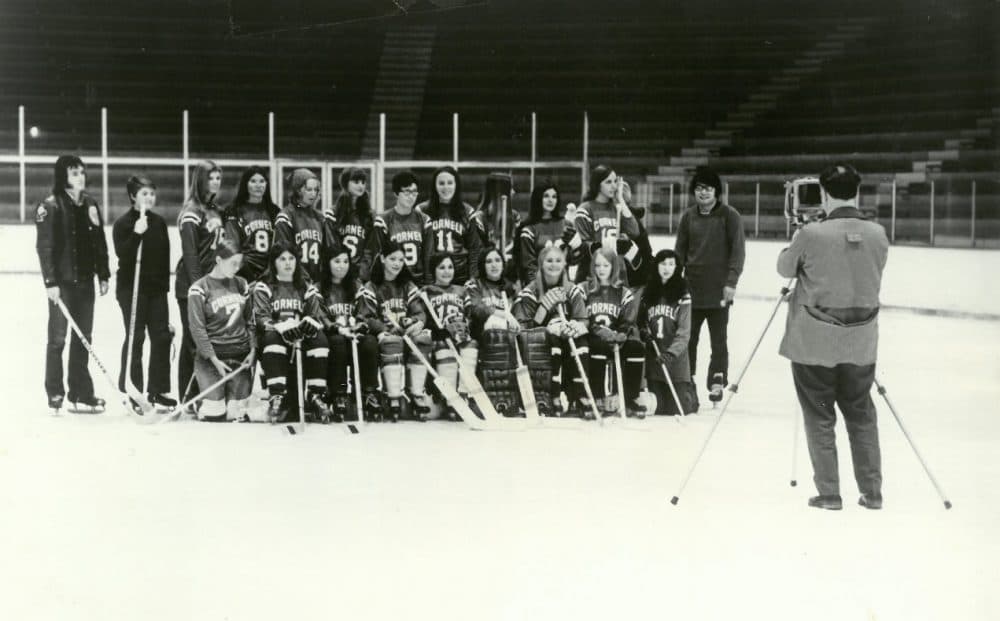
Reggie and Reenie Baker grew up in North Lansing, New York — not far from Cornell University, where their father was a professor.
"It was in our blood to play hockey," says Reenie Baker Sandsted. "My dad was a huge Cornell hockey fan."
"He had us all, us kids, playing ice hockey on the pond down behind the house," says Reggie Robbins. "He would shovel it off once the ice was hard enough to hold a tractor."
"Every Sunday, the local boys would come to play and my sister, Reggie, and I would also play, too," Reenie says.
Reenie and Reggie were the only girls who played.
"So, did people think you were weird?" I ask.
"No," she says. "We were just the kid sisters that were probably a nuisance. But, no."
Of the two hockey-playing Baker girls, the older sister, Reggie, was always the better player.
"I would go down at night, after I got home from school, and I would just practice and practice with the puck," Reggie says. "And then in the summer, I was on the driveway with a hockey stick and a tennis ball. I just knew from very, very young that I was gonna start the team at Cornell. I just never doubted that."
"So that was part of the reason you wanted to go to Cornell, the whole thing?" I ask.
"The only reason," Reggie replies, laughing. "That was my life."
'No, You Absolutely Can't Have A Team'
When Reggie was still in high school, she asked her science teacher, Gail Murphy, if she’d be willing to coach a team at Cornell. She said yes.
"So we hung up flyers all over Cornell. I wasn't even accepted yet at Cornell," Reggie says.
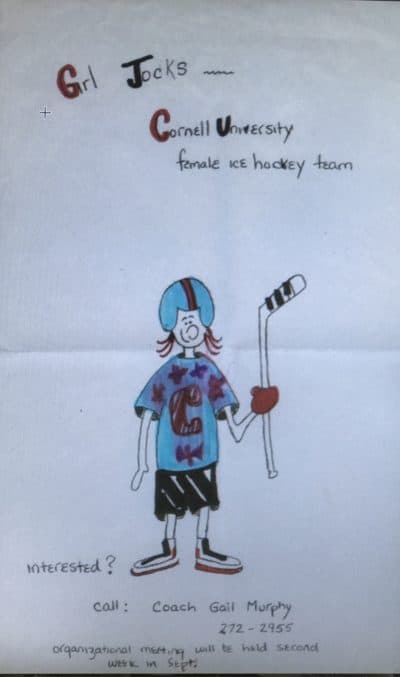
In the fall of 1971, they ran their first hockey practices ... on the football field.
"We were just running steps," Reggie says.
"It was excruciating," says Pen Mapes Cook, one of the early team members.
Soon after Pen arrived on campus in 1971, her roommates saw one of Reggie’s flyers. They knew that Pen was a hockey fan. But she — and most of the other women who joined the team — had never actually played.
"You’d ice skated before, right?" I ask.
"Ah, very little. I really did learn to skate on the team," Pen says.
She had to learn everything about the game.
"Simple things, like, watch their eyes, don't watch the puck. Just everything," Pen says. "I knew about putting the puck in the net, but that was about it."
But first, the team would have to get on the ice. There was only one rink in Ithaca in 1971. Reggie says it was October or November before she even asked for ice time.
"Gene, who ran the Lynah Rink, said, 'Well, no, you know, you're not a varsity team,'" Reggie says. "He said, 'You have to go to the athletic department.' So I made an appointment and went with Gail Murphy, we went down."
This had been Reggie’s dream for as long as she could remember. She never considered the possibility that the school wouldn't say yes.
"And we got in there and they said, 'No. No, you absolutely can't have a team,' " Reggie remembers. "It wasn't so much prejudice, as it was just, 'Women can't do it. Women aren't capable.' So I was really ready to start arguing with them, and Gail took me by the arm and she pulled me out of the room. And she said, 'You're going to have to accept, you gave it your best, but it's not gonna happen.' "
Reggie immediately went to her father’s office. Remember, he was a professor at Cornell.
"And I just started crying, and he looked at me. He didn't even know what was going on. He didn't know why I was crying so hard. And when I finally settled down enough to talk, he said, 'OK, sit here for a minute. Sit here and I'll be back,' " Reggie says. "So he left the office for an hour and then he came back. And he said, 'The athletic department wants to talk to you again, Reg.'
"Johnny Hutter, who was the head of the athletic department, said, 'Reggie, Reggie, why'd you leave so quickly? We weren't done talking yet.' Well, we were. We were done talking."
"You hadn't misinterpreted?" I ask.
"No, but he said, 'Yes, you can have the team,' " Reggie recalls. "I don't know what my dad said. I don't know when Cornell would have had a real team if it hadn't been for him."
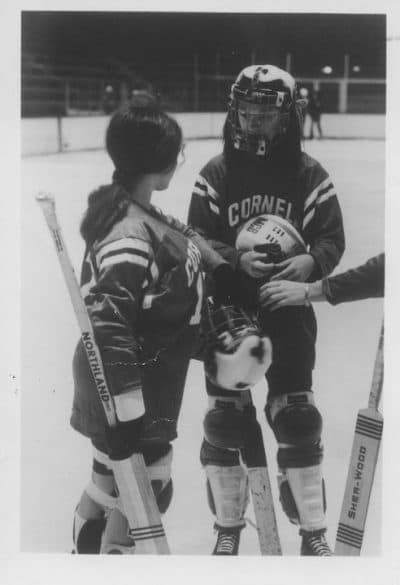
Even with varsity status, Cornell had a long way to go before they’d play like a real team.
"And how was your first game?" I ask Reggie. "How did it go?"
"We're not gonna talk about that, OK?" she replies, laughing.
"So, potentially, the score I've read is correct?" I ask. "I think I read 14 to 1."
"No, it's 14-0, I believe."
Before long, Cornell was winning games. Lots of them. And, at least from Reggie’s perspective, her school had started a trend.
"Teams started springing up everywhere, but I don't think many of them went varsity right away," she says. "It was really Cornell. They were wonderful. Cornell was wonderful."
'I Think That Might Be A Place I Could Start A Team'
The story I’d heard — the one that led me to reach out to the Baker sisters — was that two years after Reggie successfully convinced Cornell to start a hockey team, she convinced her younger sister, Reenie, to start a team at Boston College. But Reggie remembers it differently.
"She did that on her own," she says of Reenie. "I was totally absorbed with Cornell hockey."
Here’s how Reenie says it happened.
"I was planning to go to a school out in Ohio," Reenie says. "But Reggie started encouraging me to go to a school that might start a women's team because there wasn't much competition for the Cornell women."
Reenie says it must have been difficult for her sister to start the program at Cornell. But from her perspective, watching from afar, it looked like fun.
"And so Reggie and I went to Boston for the ECAC finals for the men's hockey, and Boston College beat Cornell," Reenie says. "And I said, 'I'm gonna go apply at that school. I think that might be a place I could start a team.' And that's, honestly, the reason I went to Boston College."
I ran this version of events by Reggie. She said she doesn’t remember, but if her younger sister says it, it must be true.
But Reenie Baker soon found that Boston College, which had only become fully coed three years earlier, wasn’t ready for something as radical as a women’s ice hockey program. Reenie approached the athletic department, and they sent her to see a woman — she might have been the head of the women’s sports programs.
"Her first name was Bobbie, but I can't think of her last name now," Reenie says. "She really felt as though I wouldn't get any interest. I told her that I would start some organizational meetings and come back to her with a list of people that were interested."
Soon, Reenie had compiled a list of 25 women who wanted to play ice hockey. There was just one problem.
"None of them had any ice hockey backgrounds," she says. "Most of them were figure skaters."
"I read in the school paper that your first few weeks of practice were just basic skills and hockey knowledge. Is that fair?" I ask.
"That's very fair," Reenie says with a laugh. "That's very fair. I can remember our very first game we played, they dropped the puck in the center and the other team — I can't remember who it was — hit the puck and it went very slowly down toward the goalie and went right in the goal. We were a little rough around the edges, for sure."
The school stood by its decision not to fund a varsity team. But Reenie and her teammates were allowed to continue as a club.
"But we still weren't getting any support, so we had to do fundraisers because we at least needed some knee pads," Reenie says. "They did give us jerseys that were discards from the men's hockey team. But no helmets and no protective gear at all."
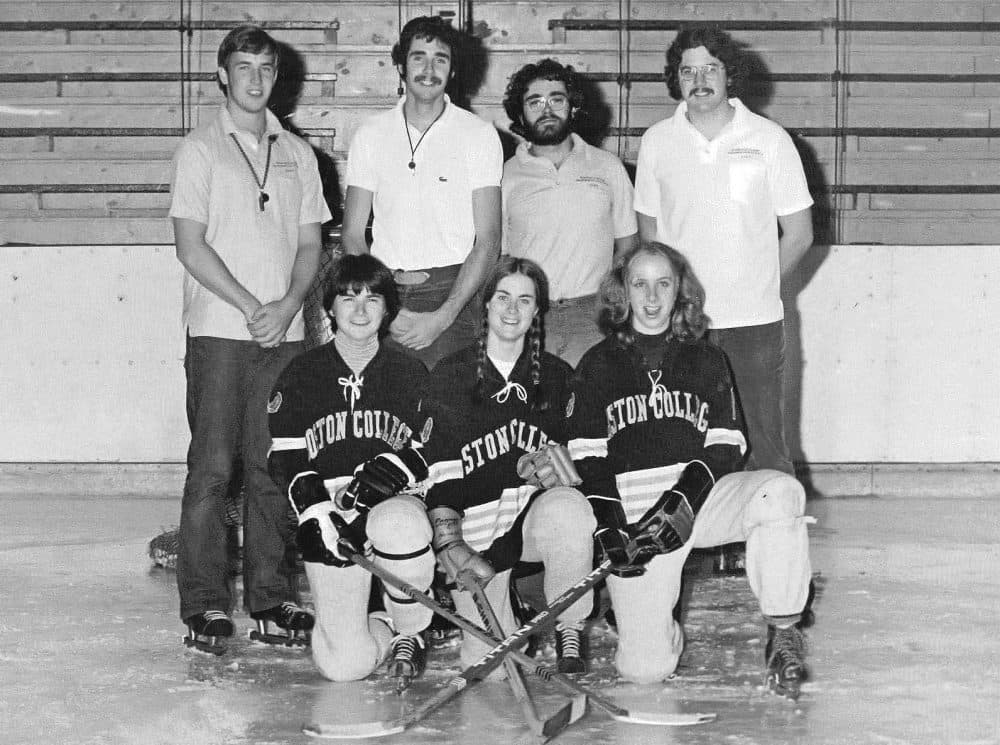
This was 1973 — the year after Title IX, the federal law mandating equal opportunities for men and women in sports, was passed. So, Reenie marched down to the equal opportunity office. But since her team was officially a club, she was required to invite university staff. And since she had staff on the team, the equal opportunity office didn’t feel that this was an issue they needed to address.
It was a logic loop that Reenie couldn’t fight her way out of.
"This went back and forth for two years," Reenie says. "At this time, now, we were playing against teams that would come out on the ice with, you know, full uniform, and helmets, and mouth guards, and we were in our sweatpants, our figure skates. I know I ended up at the hospital twice for being hit in the face with a puck."
Cornell Vs. BC
One of those teams getting full support from their university was the one Reenie’s older sister had started: Cornell. They held the first women’s ice hockey invitational in 1973. Boston College attended.
"Everybody stayed at my house because we didn't have money to stay anywhere else," Reenie says of her team's trip to Ithaca. "And we came in cars. We didn't come in a bus or anything. And the team felt — they were in awe at how Cornell came out in these bright red uniforms and, you know, just looked so spiffy. And we're in, you know, we looked very bedraggled next to them.
"Some of the times when I would make a breakaway and head for the goal, they would start cheering for me because they were just — they felt so bad for us."
But it’s not pity that Reggie remembers feeling.
"Seeing her skate, it was really cool," Reggie says.
"She says that you and members of your team would cheer for her," I say.
"Oh, yeah. Oh, of course. She was a Baker."
Reenie says that by the end of her time at BC, she was more of an onlooker than a player. So no one was more surprised than Reenie Baker when, in 1976, the BC women’s ice hockey team awarded its MVP trophy and called it the Baker Cup.
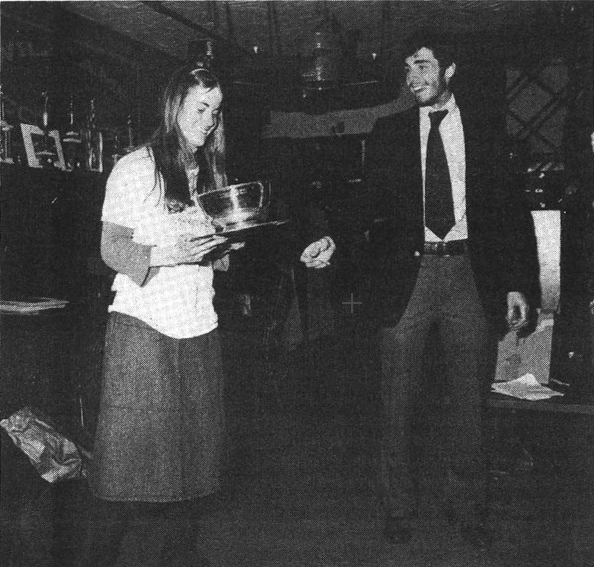
"Marty, the coach, really wanted to let everybody know who had started the team and who had fought to make this team happen. Because it was a battle," Reenie says. "It was really a battle."
45 Years Later
Last summer, Reggie Baker, now Robbins, came back for a reunion of the women’s ice hockey program.
"It was incredible to see the locker rooms they have now, and the equipment they have now," Reggie says. "I couldn’t believe it. I felt so honored to be there and to see that what had started 45 years ago was going even stronger now."
But Reenie Baker Sandsted’s memories of playing hockey at BC are more complicated. She moved away after graduation. Over the next two decades, she checked in with the team from time to time to ask if they’d been made varsity yet. Every time, the answer was no.
"I felt as though I was not a success, that I did not succeed in what I had hoped to achieve," Reenie says.
Boston College finally started a varsity women’s hockey program in 1994. But, by then, Reenie had stopped checking in.
And then, last fall, Boston College played a game at Syracuse, and Reenie drove up from North Lansing to watch. It was the first time she’d seen her alma mater on the ice as a varsity team.
"I must have just been beaming the entire time," she says. "I was so proud to see them."
"Did the women on the ice know who you were and your story?" I ask.
"No, no. I had contacted the coach and I had told her I was going to be there. And she didn't really invite me to — I would have loved to have just stepped into the locker room and just shook hands with some of these women, but I didn't want to push myself on them."
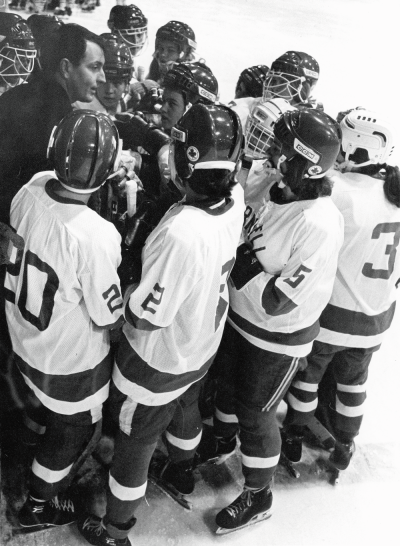
Reenie’s role in founding the team, the Baker Cup — all of that was written up in the student newspaper back in the 1970s. But when I got in touch with the Boston College athletic department, they said they had no records from before the women’s hockey team turned varsity in 1994. The team has not awarded an MVP trophy — Baker Cup or otherwise — during those 24 seasons.
The Stage Is Set For Pyeongchang
But this story isn’t over yet. Because the Baker sisters are both watching this women’s Olympic hockey tournament with pride. If all goes according to expectations — and there’s no reason to think it won’t — it’ll be the U.S. against Canada in the finals next week.
And, as it happens, the U.S. women’s hockey team has five current or former Boston College players on its roster. The Canadian team lists five from Cornell.
"It sort of brings together my sister's work and my work," Reenie says. "Oh, my gosh, I just, I'm excited for the Cornell women, and I'm excited for the BC women."
Read more about how Reggie Robbins started the hockey program at Cornell in Jim Roberts and Arthur Mintz's book "Forever Faithful: Celebrating the Greatest Moments of Cornell Hockey."
This segment aired on February 17, 2018.
